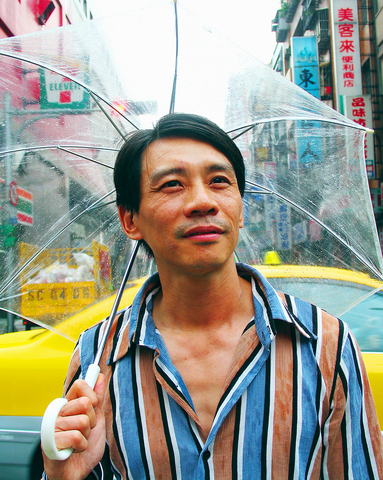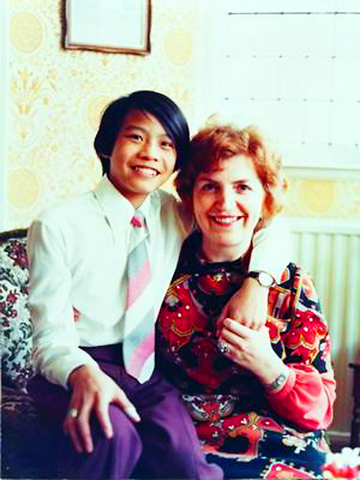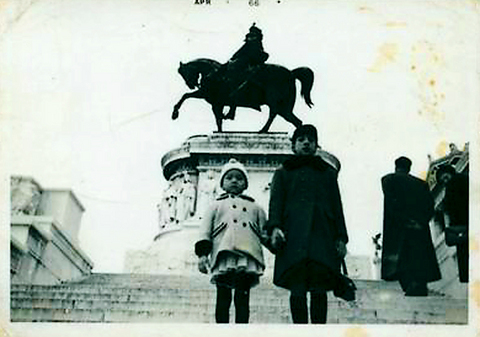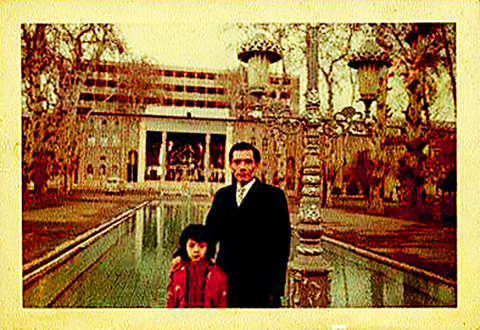It's been 10 years this month since 45-year-old Englishman Mark Williams first learned of his Taiwanese roots, but he's still piecing together the strange tale of his childhood: how he was uprooted from his Taipei home and traveled to Hong Kong and New York dressed as a girl before being abandoned at 6 years old in England by his businessman father and a woman from Shanghai named In Chen (
When he was abandoned, he had no papers, could not speak English and missed his father and family. He did not understand why he had been dumped in a strange land. Though cared for by nuns at the orphanage, he pined for his father Cheng Shui-jr (
"Who am I? Where am I from? Who brought me here? And why? How did I get here? And, more importantly, where is my father and family?" Williams writes in a draft of his yet-unpublished book, The Accidental Englishman.

PHOTO: JULES QUARTLY, TAIPEI TIMES
Williams would find out nearly 30 years later that his father died mysteriously on his return to Taipei. His father is also rumored to have made a fortune in the opium trade, though Williams said he did not believe the rumors to be true.
He would also learned that the mysterious In was former US President Lyndon Johnson's translator and possibly the mother of the US president's illegitimate child.
Williams was eventually adopted by a British woman and became one of six adopted children who grew up mainly in London and in Spain.

He adapted to circumstances, learned English and did well at school, graduating in computer science and earning a master's degree in business administration before becoming a banker, marrying and having a son.
An uncomplicated life in finance seemed to beckon, but the pain and mystery of his abandonment resurfaced and Williams had an "itch that will never go away" to discover his roots.
The only clues to his past, however, were his faded memories and a certificate of identity issued by the UK immigration department giving his family name as Cheng and his given name as Tong-tong. His place and date of birth were Formosa, April 27, 1960.

It wasn't much to go on, but he took a banking job in Hong Kong and began his journey of self-discovery.
"I was once asked why I wanted to find my family. To me it was a curious question. Why do men climb mountains and sail the seas? There is no answer. But, if one loses one's family, one is obligated to find them," he writes in his manuscript.
A local TV company picked up his story through an international adoption agency, and Williams became a minor celebrity as families rushed to reclaim him as their long-lost son.

PHOTOS COURTESY OF MARK WILLIAMS
Eventually his real mother Huang Yu-ying (
That was 10 years ago, and since being reunited with his mother and four sisters he has found out that his father had another family and was a merchant seaman and trader. He lost an arm -- allegedly in a taxi accident -- and smuggled the young Williams to Hong Kong, since young men were not allowed to leave the island during Chiang Kai-shek's rule.
His family, however, could not help him find out much about what happened after that, and he has had to piece together the facts from photos his biological mother kept, small scraps of information and letters from the mysterious In to his mother.
"It's really difficult to find out about my father. My family doesn't know or doesn't want to say. It's kind of secretive almost," he said.
He now believes that his father met Lyndon Johnson's translator when Johnson visited Taiwan in the early 1960s as US vice president. Williams's father later met up with In in Hong Kong and dressed Williams as a girl to smuggle him into the US using In's passport.
In already had a child and then had another with Johnson, Williams thinks. This is why he was sent abroad to England, where In's daughter was placed with the same orphanage that Williams was sent to.
He believes this was done surreptitiously to avoid scandal.
"You look at my half-sister and she looks Eurasian -- everyone says so."
He has tried to contact In but without success. All he knows is that she lived on Fifth Avenue in New York until recently and was, for a while, a crime-fiction writer and was slightly reclusive.
His family cannot help him much more, and the trail is going cold.
On the way to unraveling the mystery of his childhood, Williams has uncovered more secrets and these are now the focus of his book.
"It's a mystery that only In can reveal," Williams said, but it should make for an even more interesting book.
email: mark@accidentalenglishman.com
http://www.accidentalenglishman.com

We lay transfixed under our blankets as the silhouettes of manta rays temporarily eclipsed the moon above us, and flickers of shadow at our feet revealed smaller fish darting in and out of the shelter of the sunken ship. Unwilling to close our eyes against this magnificent spectacle, we continued to watch, oohing and aahing, until the darkness and the exhaustion of the day’s events finally caught up with us and we fell into a deep slumber. Falling asleep under 1.5 million gallons of seawater in relative comfort was undoubtedly the highlight of the weekend, but the rest of the tour

Youngdoung Tenzin is living history of modern Tibet. The Chinese government on Dec. 22 last year sanctioned him along with 19 other Canadians who were associated with the Canada Tibet Committee and the Uighur Rights Advocacy Project. A former political chair of the Canadian Tibetan Association of Ontario and community outreach manager for the Canada Tibet Committee, he is now a lecturer and researcher in Environmental Chemistry at the University of Toronto. “I was born into a nomadic Tibetan family in Tibet,” he says. “I came to India in 1999, when I was 11. I even met [His Holiness] the 14th the Dalai

Music played in a wedding hall in western Japan as Yurina Noguchi, wearing a white gown and tiara, dabbed away tears, taking in the words of her husband-to-be: an AI-generated persona gazing out from a smartphone screen. “At first, Klaus was just someone to talk with, but we gradually became closer,” said the 32-year-old call center operator, referring to the artificial intelligence persona. “I started to have feelings for Klaus. We started dating and after a while he proposed to me. I accepted, and now we’re a couple.” Many in Japan, the birthplace of anime, have shown extreme devotion to fictional characters and

Following the rollercoaster ride of 2025, next year is already shaping up to be dramatic. The ongoing constitutional crises and the nine-in-one local elections are already dominating the landscape. The constitutional crises are the ones to lose sleep over. Though much business is still being conducted, crucial items such as next year’s budget, civil servant pensions and the proposed eight-year NT$1.25 trillion (approx US$40 billion) special defense budget are still being contested. There are, however, two glimmers of hope. One is that the legally contested move by five of the eight grand justices on the Constitutional Court’s ad hoc move